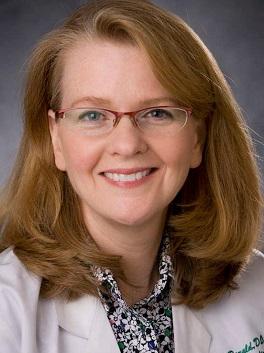
Shelley R. McDonald, DO, PhD, associate professor in the division of Geriatrics, has been selected as the 2023 American Geriatrics Society Clinician of the Year.
The award recognizes exceptional health professionals who deliver outstanding care to older adults and model the importance of geriatrics. Dr. McDonald—with her heart for service—colleagues say, is a shining example of the award ideal.
Since joining the geriatrics faculty at Duke in 2014, McDonald, a strong advocate of collaborative practice, has worked energetically to build bridges in clinical care and promote a culture that prioritizes patients and their families, and empowers them as active participants in their own health care.
She is perhaps best known for her instrumental role as geriatrics medical director of the innovative perioperative clinical care model called Perioperative Optimization of Senior Health (POSH), an interdisciplinary care program that partners with teams of surgeons, anesthesiologists, geriatricians and others to help patients and their families prepare for surgery and recovery with targeted interventions such as delirium risk mitigation, enhancement of mobility, and nutrition.
POSH program outcomes have shown that patients have shorter lengths of hospital stays, lower readmission rates at 7 days and 30 days, and are more likely to be discharged home with self-care while experiencing fewer complications. (JAMA Surgery 2018)

“My heart has always been with older adults,” McDonald says. “The ultimate reward is the appreciation from each older adult, and those who support them, for the thoughtful diligence of the entire POSH team to actively listen and address the issues that matter most to that person throughout their surgical encounter.”
From one or two patients per week, POSH has now worked with thousands of older patients as McDonald provides the steady hand supporting continued growth. She has also opened POSH to Duke researchers, and the model is being replicated at other institutions.
“My surgical colleagues have become ardent supporters of POSH as they have experienced the impact of Dr. McDonald's leadership,” says Dr. Sandhya Lagoo-Deenadayalan, MD, PhD, professor of surgery, who has worked alongside McDonald to establish POSH. “Almost weekly I hear other surgeons' stories of the impact she is having. My own patients are quick to tell me that their extra pre-operative visit was well worth their time and that they appreciated the guidance provided by Dr. McDonald. Both surgeons and patients are embracing the standard of collaborative care that leads to attainment of patient specific goals and successful peri-operative outcomes largely because of the personal example she provides.”
McDonald connects with patients and caregivers in the clinic through a love of gardening and cooking, says Heidi K. White, MD, MHS, MEd, vice chief of clinical affairs in the division of Geriatrics, whose first recruit to Duke’s geriatric faculty was McDonald.
“These connections build bridges when people are overwhelmed and out of their comfort zone,” says White, adding that she too has learned from McDonald’s example as she watched her gently nudge physicians toward better nursing home practice patterns and support colleagues in ways that leave them with perspective and skills that influence their practice-setting decisions. “When other geriatricians meet her patients in the hospital there is instant rapport because of the time she has taken to gain their trust.”
Connections and Clinical Innovations
The chemistry between McDonald and geriatric patients is easygoing and down-to-earth, rooted in her life experiences growing up in a single parent home in a small Texas town but in a neighborhood full of older widows. She started delivering newspapers at age 13 and during high school cleaned houses for older adults. Her hometown offered a great scholarship for McDonald to attend Baylor University. Not only did she receive a master’s degree in clinical gerontology from Baylor University, she went on to earn a PhD (Pharmacology & Neuroscience)/DO from the University of North Texas in 2004. All this while caring for both her mother and grandmother in her home until they both died with Alzheimer’s. McDonald’s grandmother also suffered from the disease.
It was these experiences—along with working as a first responder, collecting and processing blood for the American Red Cross, being admitted to a nursing home as an empathy experience, among others—and McDonald’s personal character that have contributed to her success as a clinician, her colleagues note.
“I enjoy the challenge of navigating the complex medical conditions, functional limitations, and barriers to psychological health for those who are most vulnerable when facing a time of impending surgical stress,” says McDonald, whose enjoyment of organizing such complexities into systematic processes that raise the standard of care serve as the impetus for her to keep looking for new solutions and fostering collaborations. “This creates a problem-solving challenge that is unique for each patient with the benefit of being able to maximize the health and well-being for those in this special age group.”
McDonald also serves as a co-investigator and study physician for the Center for Aging Nutrition Laboratory at Duke and dedicates her time to clinical activities in both outpatient Duke and Durham VA Medical Center POSH clinics, as well as the inpatient geriatrics consult service. McDonald also teaches and mentors future clinicians, researchers, and educators; collaborates with many surgical and geriatrics researchers; and administratively coordinates the providers and processes for the POSH model including monitoring quality of care and collection and management of the clinical database.
Her collaborations with researchers and clinicians across the country have resulted in numerous high-profile publications and grants. In an effort to further combat the siloed approach to health care, she has developed and disseminated several organized resources and templates so that other geriatricians can provide high-quality assessments and recommendations for implementing patient risk-reduction strategies.
“Dr. Shelley McDonald has taken what some may see as a circuitous path that has culminated in a clinical practice that has brought her numerous talents and skills to bear on an exceptional clinical career that continues to influence patients, families, peers and the operation of healthcare systems,” says Professor Cathleen Colón-Emeric, MD, chair of the division of Geriatrics. “She more than fulfills the high standards of this award.”